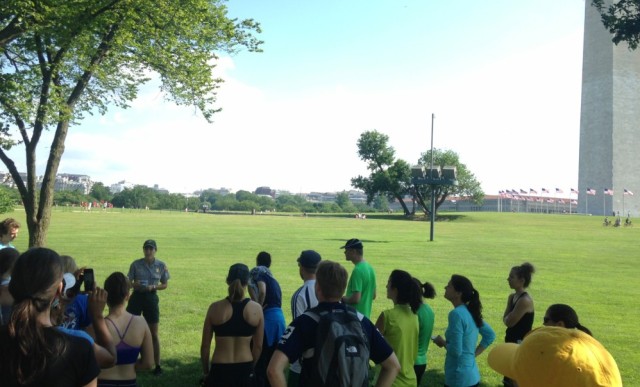
History buffs might outnumber runners in D.C., but the National Park Service ranger runs blend the two popular aspects of capital culture.
“What a great concept,” said Russell Briggs, of Syracuse, N.Y. He’s in town for a project with the U.S. Forest Service, and he saw the sign for the run on his walk home from work.
“I’ve always like the monuments,” he said. “It was nice to see this piece of it and a little running. I didn’t realize [Pierre Charles] L’Enfant was the great mastermind behind it, which is kind of interesting because I go to L’Enfant Plaza, but I had no idea.”
Ranger Niki Cochran led the Flag Day run with an appropriate holiday
“I usually focus on a theme,” she said. “There’s so much history in DC that you need some sort of parameters to close in on it.”
Selecting shareable facts from the massive amount of information about the monuments requires Cochran and other rangers to account for the composition of the group.
Many of the 30 people at the June 14 event came from across the country. Colleen Gaffney grew up in the area as a child, but she now lives in Orlando, Fla.
“I couldn’t wait to introduce my kids to the city,” she said. The rest of her family waited in line for tickets to go up into the monument while Gaffney joined the morning run, which meets rain or shine at 8 a.m. at the Washington Monument lodge on 15th Street.
“I thought we’d be all out of breath and running from thing to thing trying to hear what our guide was saying,” she said. “The little stops in between were just perfect.”
The group averages around a 9- to 10-minute mile pace with routes that last about an hour and a half. The Flag Day run included the Smithsonian Castle, the south lawn of the White House, the World War II Memorial and the Jefferson Memorial.
“It’s a good run that most people could probably keep up with,” said Theresa Barras. “Even if it’s a little fast for some, you’re not going that long before you stop.”
Barras lives in Texas but is moving to D.C.
“We actually commented that it would be hard to run here because there’s so many streets to stop at,” she said. “Stop and go, stop and go. Now I know where I can come and run.”
As promised, the routes include plenty of history lessons. For instance, buffalo once grazed on the lawn behind the Smithsonian Castle when the National Zoo first started on the Mall.
At the World War II Memorial, a local runner can easily overhear comments about the strange layout of the state pillars. Anyone joining the ranger run would learn that the seemingly random arrangement is a deliberate placement based on when the state entered the Union. Looking east toward the Lincoln Memorial, Delaware leads the way on the left. The order then ping pongs back and forth from left to right around the oval plaza.
Plenty of locals joined the run sporting shirts from familiar area races. These people in particular drive Cochran and other rangers to find a diverse set of trivia.
“You don’t want to hear the cut-and-paste of the World War II Memorial story,” Cochran said. “It’s good to try to mix in some unique with the standard.”
Sepp Scanlin, of D.C., started volunteering with the runs at the opening of the 2014 season. Ranger runs started as an addition to the Cherry Blossom Festival, and in 2010, the popularity of the event prompted the National Park Service to add summer dates. The program now takes place March through October on the second and fourth Saturdays, with some breaks for major holidays.
Even though Scanlin has assisted on many runs, boredom hasn’t set in yet.
“It’s fresh every time, even for me,” he said. “There’s common spots, but even when we stop at the same spot, we talk about different things. I learn tidbits every time I take the tour.”
The next ranger run will happen on June 28 with a Thomas Jefferson and John Adams theme as an early celebration of Independence Day.

